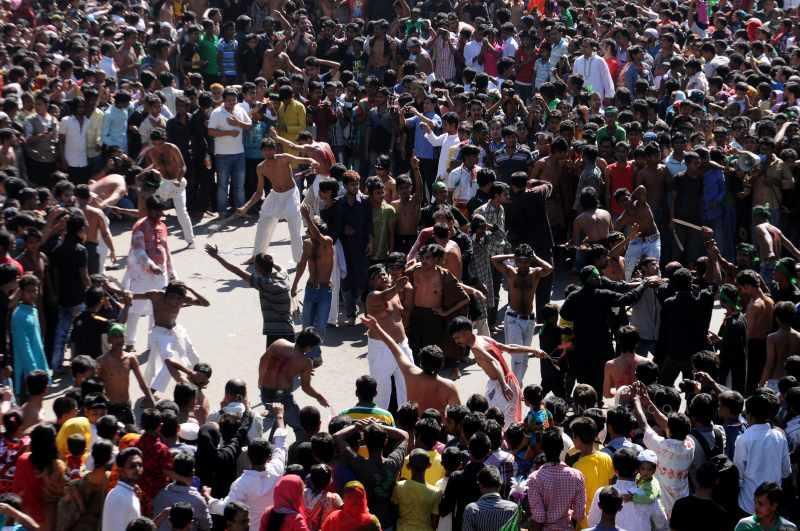C Uday Bhaskar, Distinguished Fellow, Society for Policy Studies, is analysing the new Iraqi crisis for Asian Lite, the international newspaper for the Asian diaspora. Can Pakistan be saved from going the Iraq way?

The Pakistan military launched Zarb-e-Azb, a major offensive operation against terror groups operating from North Waziristan Sunday, a week after the Karachi airport was audaciously attacked by the Taliban. In the last 48 hours, it is reported that more than 170 terrorists were killed while six soldiers died during the operation which is still continuing.
Pakistan Prime Minister Nawaz Sharif declared: “We will no longer allow Pakistan to be a sanctuary for terrorism at any cost.” The military in turn has highlighted in a press release that it is acting on the “directions” of the civilian government and has “been tasked to eliminate these terrorists regardless of hue and colour, along with their sanctuaries”.
On the face of it, this is a welcome development, in that the Pakistan military has publicly reiterated two critical determinants; first that it is operating as per the directives of the elected government and second, that it will eliminate “terrorists regardless of hue and colour”. The inference that follows is that this time around there will be no distinction between the good and the bad terrorist.
However, there have been two other military operations that GHQ Rawalpindi had initiated in 2009 in Swat and South Waziristan and in both cases, after imposing a heavy cost on the terror groups, the military withdrew without seeking effective closure and the various terror outfits regrouped to challenge the state again. The Karachi airport attack is illustrative of the determination and virulence of the ideology that is driving the Taliban and its affiliates.
Both the Pakistani political establishment and the military are culpable of having nurtured and sought the support of different factions of the right-wing constituency for their own institutional advantage. If the Pak army and the intelligence agencies created and supported certain groups to obtain “strategic depth” in both India and Afghanistan through proxy, political parties led by Nawaz Sharif and cricketer-turned-politician Imran Khan portrayed the Taliban as brethren who had been misguided and held out the olive branch of reconciliation. Even when the Pak Army wanted to pursue a more robust anti-Taliban policy after the beheading of troops, the political ambivalence prevailed.
Karachi is being seen as the tipping point and the name of the operation – Zarb-e-Azb – which means sharp and cutting has a religious salience that merits notice. The theological reference is to the sword of Prophet Muhammad reportedly used in the battle of Badr (624 AD) and by invoking this symbol, the Pak military, it may be conjectured, is assuming a mantle of higher religious legitimacy against the Taliban. The latter in turn perceive themselves as the true guardians of the faith and their objective is to impose an intolerant, inflexible version of the practice of Islam, in which the Shia and other sects are legitimate targets for slaughter.
None of these developments are new to Pakistan and have been gathering momentum for decades with the connivance of the state and civil society. A malignant ideology and a destructive eco-system that intimidated the non-Sunni denominations through political connivance and the introduction of draconian blasphemy laws reached its most tragic manifestation in the assassination of Punjab Governor Salman Taseer by his own bodyguard. His crime – supporting due legal process in a blasphemy case against a Pakistani Christian woman.
It may be recalled that the Lal Masjid (Red Mosque) episode of Islamabad in July 2007 that marked the end of the Musharraf era was in essence an example of how the Islamist right-wing and its pervasive support triumphed and forced the state to withdraw. At the time it was reported that even the Pakistan Army’s top leadership was uneasy with the Musharraf diktat and opined that many in the rank and file of the military would oppose any muscular action against the right-wing radicals.
Thus, the moot question is the degree to which the Pakistani political establishment in Islamabad and the GHQ in Rawalpindi will be “sharp and cutting” in eliminating the terror groups and their sanctuaries. Prime Minister Sharif has been in touch with Afghan President Ahmed Karzai to coordinate operations and deny the groups sanctuary in Afghanistan and it is expected that the US will provide tacit support in this endeavour by way of intelligence and drone attacks.
Zarb-e-Azb marks the tactical and military dimension of dealing with the (Islamist) chickens that have come home to roost. The Pak military has demonstrated that it has the ability to apply the pressure on the adversary – should it decide to do so. Yes, there have been threats of reprisal and the Pak Taliban has threatened to target Punjab – the Sharif base – which till now was off the terror radar.
The true test of Zarb-e-Azb will be its strategic and political underpinning. Will Islamabad and Rawalpindi arrive at that final and irrevocable determination to sever links with Muridke – the headquarter of groups like the Lashkar and other such centres? This is where the sharp and cutting quality is most required.
Absent this candid admission that support to terror cannot be selectively sustained, the current effort will have limited value and the lives of the Pakistani troops lost will be in vain. Sharif and Pakistan Army Chief, General Raheel Sharif, have a rare opportunity to save Pakistan from the kind of specter that now threatens Iraq.